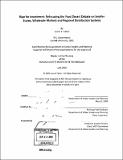| dc.contributor.advisor | Karl Seidman. | en_US |
| dc.contributor.author | Tamis, Laurie P | en_US |
| dc.contributor.other | Massachusetts Institute of Technology. Dept. of Urban Studies and Planning. | en_US |
| dc.coverage.spatial | n-us-ma | en_US |
| dc.date.accessioned | 2009-12-10T19:15:17Z | |
| dc.date.available | 2009-12-10T19:15:17Z | |
| dc.date.copyright | 2009 | en_US |
| dc.date.issued | 2009 | en_US |
| dc.identifier.uri | http://hdl.handle.net/1721.1/50119 | |
| dc.description | Thesis (M.C.P.)--Massachusetts Institute of Technology, Dept. of Urban Studies and Planning, 2009. | en_US |
| dc.description | Includes bibliographical references (p. 85-91). | en_US |
| dc.description.abstract | This thesis argues that food distribution systems must be strengthened in order to address the challenge of urban food access. The argument rests on a historical analysis of the supermarket industry and a comparative study of fresh produce sourcing in two Boston neighborhoods, North Dorchester and West Roxbury. Through a series of interviews with store owners, managers, distributors and wholesalers, the thesis illustrates the sourcing methods used by different store types (national supermarkets, local and regional supermarkets and small stores) in two neighborhoods of different incomes and different demographics. The findings reveal that store type, not store location, determines the sourcing method, of which there are two distinct systems: one for supermarkets and a secondary system for small and midsize stores. The regional wholesale produce market and local distributors play an essential role in supplying fresh fruits and vegetables to these smaller food stores, which are particularly important in low-income neighborhoods that tend to have fewer supermarkets. The thesis recommends public investment in wholesale markets and regional distribution systems to ensure that residents of urban neighborhoods have access to fresh food. | en_US |
| dc.description.statementofresponsibility | by Laurie P. Tamis. | en_US |
| dc.format.extent | 91 p. | en_US |
| dc.language.iso | eng | en_US |
| dc.publisher | Massachusetts Institute of Technology | en_US |
| dc.rights | M.I.T. theses are protected by
copyright. They may be viewed from this source for any purpose, but
reproduction or distribution in any format is prohibited without written
permission. See provided URL for inquiries about permission. | en_US |
| dc.rights.uri | http://dspace.mit.edu/handle/1721.1/7582 | en_US |
| dc.subject | Urban Studies and Planning. | en_US |
| dc.title | Ripe for investment : refocusing the food desert debate on smaller stores, wholesale markets and regional distribution systems | en_US |
| dc.title.alternative | Refocusing the food desert debate on smaller stores, wholesale markets and regional distribution systems | en_US |
| dc.type | Thesis | en_US |
| dc.description.degree | M.C.P. | en_US |
| dc.contributor.department | Massachusetts Institute of Technology. Department of Urban Studies and Planning | |
| dc.identifier.oclc | 463618748 | en_US |
